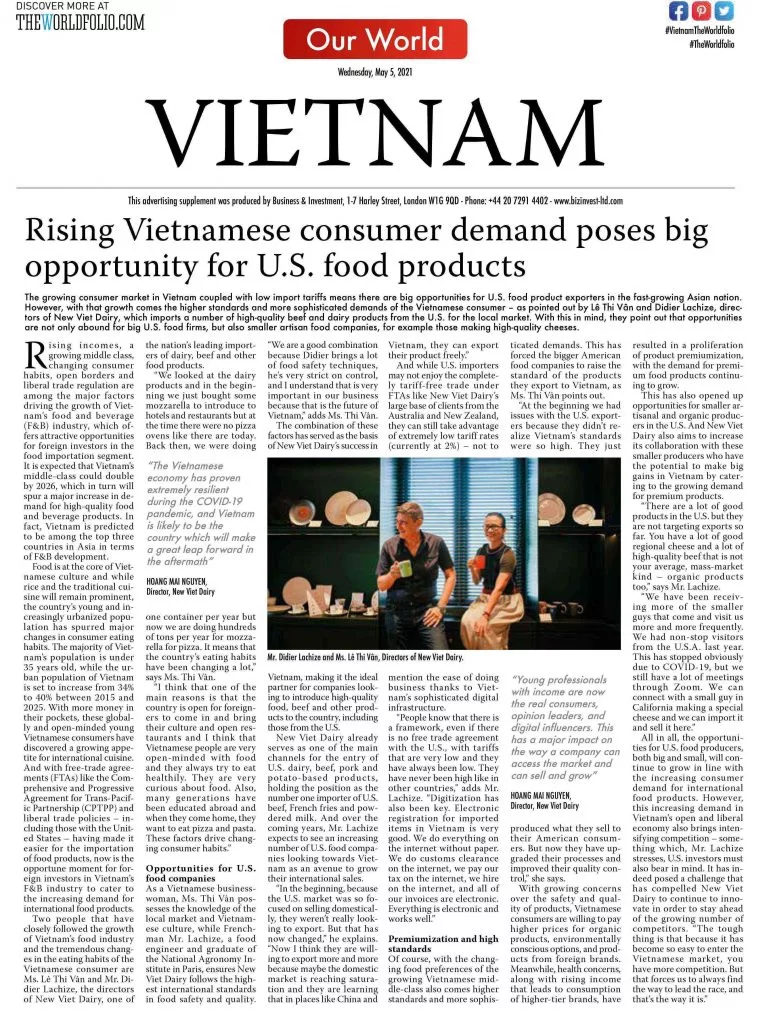The daily newspaper USA Today, which is ranking first in terms of circulation in the USA with an average of 2.4million s daily readers), has an interview with our Founders, Mr. Didier Lachize and Mrs. Le Thi Van. The article published on May 2021 on The Worldfolio – the magazine that’s attached to USA Today.
Here is the article on 05/05/2021.
Rising Vietnamese consumer demand poses big opportunity for U.S. food products
The growing consumer market in Vietnam coupled with low import tariffs means there are big opportunities for U.S. food product exporters in the fast-growing Asian nation. However, with that growth comes the higher standards and more sophisticated demands of the Vietnamese consumer – as pointed out by Lê Thi Vân and Didier Lachize, directors of New Viet Dairy, which imports a number of high-quality beef and dairy products from the U.S. for the local market. With this in mind, they point out that opportunities are not only abound for big U.S. food firms, but also smaller artisan food companies, for example those making high-quality cheeses.
Rising incomes, a growing middle class, changing consumer habits, open borders and liberal trade regulation are among the major factors driving the growth of Vietnam’s food and beverage (F&B) industry, which offers attractive opportunities for foreign investors in the food importation segment. It is expected that Vietnam’s middle-class could double by 2026, which in turn will spur a major increase in demand for high-quality food and beverage products. In fact, Vietnam is predicted to be among the top three countries in Asia in terms of F&B development.

Food is at the core of Vietnamese culture and while rice and the traditional cuisine will remain prominent, the country’s young and increasingly urbanized population has spurred major changes in consumer eating habits. The majority of Vietnam’s population is under 35 years old, while the urban population of Vietnam is set to increase from 34% to 40% between 2015 and 2025. With more money in their pockets, these globally and open-minded young Vietnamese consumers have discovered a growing appetite for international cuisine. And with free-trade agreements (FTAs) like the Comprehensive and Progressive Agreement for Trans-Pacific Partnership (CPTPP) and liberal trade policies – including those with the United States – having made it easier for the importation of food products, now is the opportune moment for foreign investors in Vietnam’s F&B industry to cater to the increasing demand for international food products. Two people that have closely followed the growth of Vietnam’s food industry and the tremendous changes in the eating habits of the Vietnamese consumer are Ms. Lê Thi Vân and Mr. Didier Lachize, the directors of New Viet Dairy, one of the nation’s leading importers of dairy, beef and other food products. “We looked at the dairy products and in the beginning we just bought some mozzarella to introduce to hotels and restaurants but at the time there were no pizza ovens like there are today. Back then, we were doing one container per year but now we are doing hundreds of tons per year for mozzarella for pizza. It means that the country’s eating habits have been changing a lot,” says Ms. Thi Vân.
“The Vietnamese economy has proven extremely resilient during the COVID-19 pandemic, and Vietnam is likely to be the country which will make a great leap forward in the aftermath” HOANG MAI NGUYEN, Director, New Viet Dairy
“I think that one of the main reasons is that the country is open for foreigners to come in and bring their culture and open restaurants and I think that Vietnamese people are very open-minded with food and they always try to eat healthily. They are ver y curious about food. Also, many generations have been educated abroad and when they come home, they want to eat pizza and pasta. These factors drive changing consumer habits.
Opportunities for U.S. food companies
As a Vietnamese businesswoman, Ms. Thi Vân possesses the knowledge of the local market and Vietnamese culture, while Frenchman Mr. Lachize, a food engineer and graduate of the National Agronomy Institute in Paris, ensures New Viet Dairy follows the highest international standards in food safety and quality. “We are a good combination because Didier brings a lot of food safety techniques, he’s very strict on control, and I understand that is very important in our business because that is the future of Vietnam,” adds Ms. Thị Vân.
The combination of these factors has served as the basis of New Viet Dairy’s success in Vietnam, making it the ideal partner for companies looking to introduce high-quality food, beef and other products to the country, including those from the U.S.
New Viet Dairy already serves as one of the main channels for the entry of U.S. dairy, beef, pork and potato-based products, holding the position as the number one importer of U.S. beef, French fries and powdered milk. And over the coming years, Mr. Lachize expects to see an increasing number of U.S. food companies looking towards Vietnam as an avenue to grow their international sales.
“In the beginning, because the U.S. market was so focused on selling domestically, they weren’t really looking to export. But that has now changed,” he explains. “Now I think they are willing to export more and more because maybe the domestic market is reaching saturation and they are learning that in places like China and Vietnam, they can export their product freely.”
And while U.S. importers may not enjoy the completely tariff-free trade under FTAs like New Viet Dairy’s large base of clients from the Australia and New Zealand, they can still take advantage of extremely low tariff rates (currently at 2%) – not to mention the ease of doing business thanks to Vietnam’s sophisticated digital infrastructure.
“People know that there is a framework, even if there is no free trade agreement with the U.S., with tariffs that are very low and they have always been low. They have never been high like in other countries,” adds Mr. Lachize. “Digitization has also been key. Electronic registration for imported items in Vietnam is very good. We do everything on the internet without paper. We do customs clearance on the internet, we pay our tax on the internet, we hire on the internet, and all of our invoices are electronic. Everything is electronic and works well.”
Premiumization and high standards
Of course, with the changing food preferences of the growing Vietnamese middle-class also comes higher standards and more sophisticated demands. This has forced the bigger American food companies to raise the standard of the products they export to Vietnam, as Ms. Thi Vân points out.
“Young professionals with income are now the real consumers, opinion leaders, and digital influencers. This has a major impact on the way a company can access the market and can sell and grow” HOANG MAI NGUYEN, Director, New Viet Dairy
“At the beginning we had issues with the U.S. exporters because they didn’t realize Vietnam’s standards were so high. They just produced what they sell to their American consumers. But now they have upgraded their processes and improved their quality control,” she says.
With growing concerns over the safety and quality of products, Vietnamese consumers are willing to pay higher prices for organic products, environmentally conscious options, and products from foreign brands. Meanwhile, health concerns, along with rising income that leads to consumption of higher-tier brands, have resulted in a proliferation of product premiumization, with the demand for premium food products continuing to grow.
This has also opened up opportunities for smaller artisanal and organic producers in the U.S. And New Viet Dairy also aims to increase its collaboration with these smaller producers who have the potential to make big gains in Vietnam by catering to the growing demand for premium products.
“There are a lot of good products in the U.S. but they are not targeting exports so far. You have a lot of good regional cheese and a lot of high-quality beef that is not your average, mass-market kind – organic products too,” says Mr. Lachize.
“We have been receiving more of the smaller guys that come and visit us more and more frequently. We had non-stop visitors from the U.S.A. last year. This has stopped obviously due to COVID-19, but we still have a lot of meetings through Zoom. We can connect with a small guy in California making a special cheese and we can import it and sell it here.”
All in all, the opportunities for U.S. food producers, both big and small, will continue to grow in line with the increasing consumer demand for international food products. However, this increasing demand in Vietnam’s open and liberal economy also brings intensifying competition – something which, Mr. Lachize stresses, U.S. investors must also bear in mind. It has indeed posed a challenge that has compelled New Viet Dairy to continue to innovate in order to stay ahead of the growing number of competitors. “The tough thing is that because it has become so easy to enter the Vietnamese market, you have more competition. But that forces us to always find the way to lead the race, and that’s the way it is.”
#TheWorldfoilio

